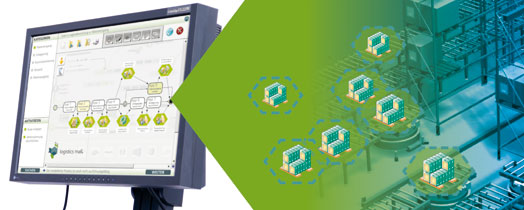Data standard of the future
The Fraunhofer Institute for Material Flow and Logistics IML develops a communication standard called »Business Objects for Logistics« (BO4L) in cooperation with the Fraunhofer Institute for Software and Systems Engineering ISST and the »EffizienzCluster LogistikRuhr«. The goal is the definition of the first independent data standard for logistic processes, which enables logistical IT applications from different vendors to interact with each other. The creation of entire process chains from various software modules (»apps«) and the integration of new applications into existing systems are significantly simplified. The results of the Fraunhofer Innovation Cluster »Cloud Computing for Logistics« build the basis for the development of the business objects standard. Business objects are required for implementation of extensive and modular IT solutions in logistics – especially in the context of cloud concepts, like the Logistics Mall: www.logistics-mall.com. Due to the common standard implementing converters has become obsolete inside the Logistics Mall. All applications understand the same product independent language: »Business Objects for Logistics«.
The first productive use of the standard has already been started in the field of online retailing of drugstore products. Business objects facilitate a consistent and seamless communication between an online shop, an enterprise resource planning system and warehouse management system.
 Fraunhofer-Institute for Material Flow and Logistics IML
Fraunhofer-Institute for Material Flow and Logistics IML
